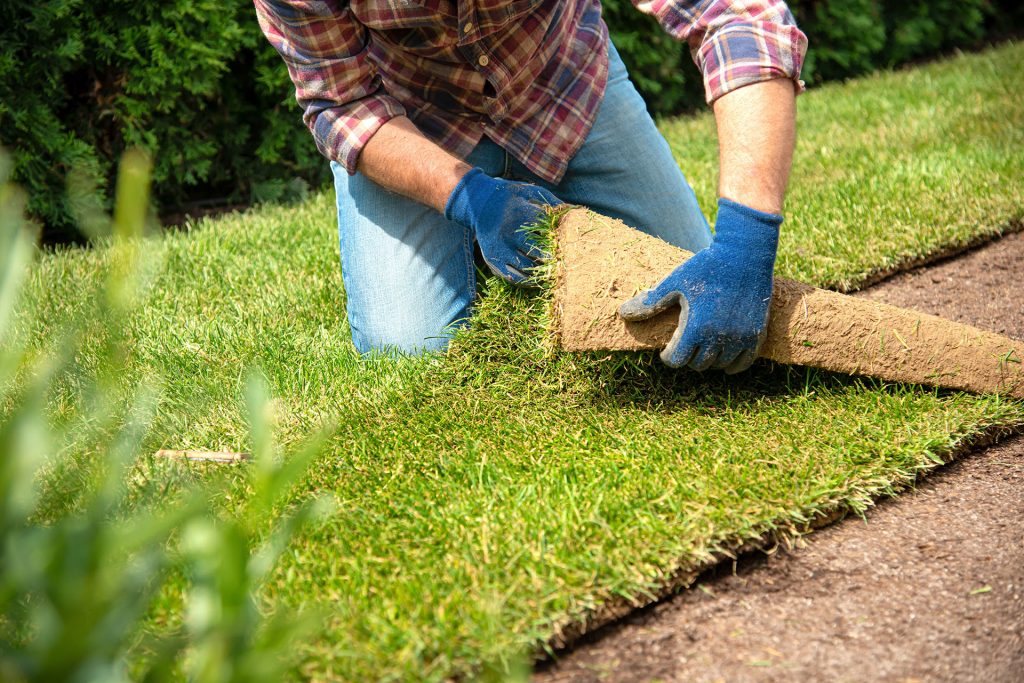
One of the most popular types of grass, Bermuda grass is arguably the best combination of beauty, low maintenance, and durability. Learning all about Bermuda grass sod will help you make the best-informed decision about whether it is right for your lawn.
If you enjoy watching sports that use natural turf such as football, soccer, golf, and tennis, you have probably seen Bermuda grass. It’s fast-growing and can withstand impacts better than many other varieties. It’s little wonder that so many homeowners want Bermuda grass sod for their lawns as it not only stands up to impacts and the elements, it’s simple to keep at the desired level through mowing.
What is Bermuda Grass?
Common Bermuda grass is a light-green, coarse-leaf texture grass that has been bred over the years to become stronger, denser, and finer in leaf texture. The grass itself has been designed to be strong and durable where it can grow in most areas of the country.
It is interesting to note that the grass is not native to Bermuda. But it is an invasive grass species which grows abundantly on the islands which have now originated its name. The grass itself comes mostly from the eastern hemisphere, but it is now found around most of the world due to its fast reproduction and durable nature.
Click here and here to discover more information about Bermuda grass and how it can be placed on your property.
Pros & Cons
Learning all about Bermuda grass sod means understanding the benefits and challenges that it offers for your yard. Keep in mind that where you live may have a strong impact on whether Bermuda grass is right for your property. Extended periods of extreme heat or cold may affect the growth and durability of the grass. With that said, here are some of the benefits that Bermuda grass has for your lawn.
![All About Bermuda Grass Sod [infographic]](https://theturfgrassgroup.com/wp-content/uploads/2021/02/All-About-Bermuda-Grass-Sod-infographic.jpg)
Tough
Arguably its greatest strength is its overall toughness. Bermuda grass offers strong, all-around durability especially in warmer conditions. The heat tolerance of the grass is quite noticeable as it can withstand high temperatures for extended periods. However, long periods of extreme temperatures will even affect Bermuda grass.
Recuperates Rapidly
Bermuda grass is not only strong it can recover faster than many other types of grass. This means that if it is damaged, it can recover quickly thanks in large part to its fast replacement rate. While this means that new Bermuda grass will grow to take the place of existing, damaged grass, the result is the same when your lawn has been compromised.
High Resistance to Disease
In addition to being tough and resilient to the elements and foot traffic, Bermuda grass also has a strong resistance to many common diseases that affect the lawn. While Bermuda grass is not impervious to all diseases, it is a rare condition that will affect its leaves and roots. Proper care and a watchful eye will help keep your Bermuda grass disease-free.
Additional benefits include its deep rooting which secures the grass into the soil and its tolerance for salinity which makes it well-suited for properties near the ocean or sea. However, as part of learning all about Bermuda grass sod, it is not impervious to all issues and it does present a few challenges.
Frequent Mowing
As with any fast-growing grass, you will need to mow Bermuda grass frequently to keep it at the desired height. This means setting a schedule and mowing when the grass grows above the level that you set. For most lawns, a height of one to two inches is best. For the long, hot summer days you can let it grow a little higher to help protect the soil from the intense heat. Otherwise, expect to mow the Bermuda grass frequently over the growing season.
Fertilization
To keep your Bermuda grass healthy, it will need to be fertilized on a regular basis. Again, this has to do with the fast-growing nature of the grass which quickly uses up the nutrients in the soil. It is recommended that the soil have ½ to 1 lb. of N per 1,000 feet. Given that it will consume most of that in less than four weeks, you will probably need to fertilize once per month during the growing season. However, that schedule may vary depending on other factors.
Tolerance to Shade
While Bermuda grass is quite healthy under sunshine, its shade tolerance is not quite as strong compared to some other types of grasses. This means that if a significant part of your lawn has trees that generate shade, then the Bermuda grass may not be the best choice. You may want to consult with a lawn care professional before deciding which type of new grass to use.
Why Choose Bermuda Grass?
There are good reasons why Bermuda grass is right for your lawn. The best reason is its heartiness and durability which means it will resist temperature variations, impacts, and regrow quickly if damaged. For homeowners, Bermuda grass is a desirable choice for a healthy, growing lawn.
Plus, its thick nature makes it resistant to weeds which will have difficulty finding space to grow in Bermuda grass. While weeds are still possible, they are easier to identify and remove because of the thickness of the Bermuda grass.
Finally, Bermuda grass is common enough that it is offered at a low, competitive price. This means that you can reap the benefits that the Bermuda grass has to offer on your lawn without breaking your budget. And in the long run, the relatively low maintenance makes it simple to keep at the desired height. For homeowners who want to augment the look of their property, Bermuda grass offers an excellent choice for your lawn.
Learning all about Bermuda grass sod will help you make the best-informed decision for your lawn. Bermuda grass offers many advantages, but there are a few downsides that you should consider as well before making your final decision. For more information, click here and here to discover what you need to know.
